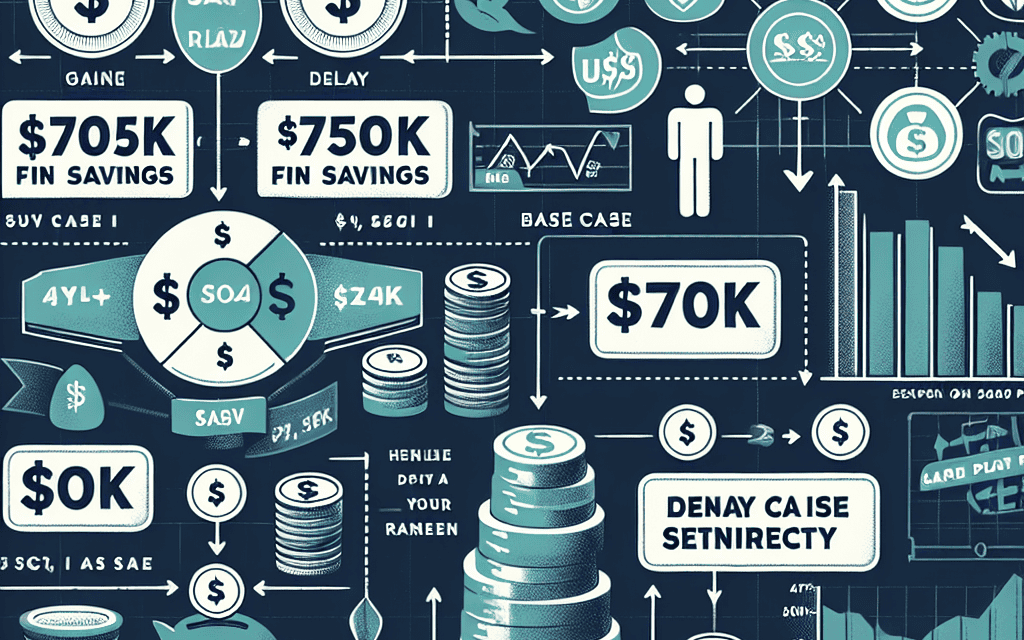“Maximize Your Retirement: Leverage 401(k) and Pension for a Secure Future.”
Introduction
When planning for retirement, individuals often face complex decisions regarding the optimal use of their financial resources. One common dilemma involves determining whether to draw from a 401(k) account while delaying Social Security benefits, especially when one has substantial savings and a pension. With $750,000 in savings and a reliable pension, the decision becomes even more nuanced. This financial strategy requires careful consideration of various factors, including tax implications, longevity risk, and income needs. By evaluating the benefits and drawbacks of utilizing a 401(k) early versus postponing Social Security, individuals can make informed choices that align with their long-term financial goals and ensure a stable and comfortable retirement.
Evaluating the Benefits of Delaying Social Security for Financial Growth
When considering the optimal financial strategy for retirement, individuals often face the complex decision of whether to draw from their 401(k) savings or delay claiming Social Security benefits. This decision becomes particularly nuanced for those with substantial savings, such as $750,000, and the added security of a pension. Understanding the potential benefits of delaying Social Security can be crucial for maximizing financial growth and ensuring a stable retirement.
To begin with, delaying Social Security benefits can significantly increase the monthly payments one receives. For each year that an individual postpones claiming Social Security beyond their full retirement age, up until age 70, their benefits increase by approximately 8% annually. This increment can result in a considerably higher income stream over the course of retirement, which can be particularly advantageous for those with a longer life expectancy. Therefore, for individuals with a robust financial foundation, such as $750,000 in savings and a pension, the strategy of delaying Social Security can be a prudent choice.
Moreover, utilizing 401(k) savings in the interim can provide the necessary financial support while waiting to claim Social Security. Withdrawing from a 401(k) allows retirees to maintain their desired lifestyle without immediately tapping into Social Security benefits. This approach not only facilitates the growth of future Social Security payments but also offers flexibility in managing tax liabilities. Since 401(k) withdrawals are subject to income tax, strategically planning these withdrawals can help retirees stay within a lower tax bracket, thereby optimizing their overall tax situation.
In addition to the financial benefits, delaying Social Security can also serve as a hedge against inflation. Social Security benefits are adjusted for inflation through cost-of-living adjustments (COLAs), which help maintain the purchasing power of retirees over time. By delaying benefits, individuals can secure a larger base amount that will be subject to these adjustments, potentially resulting in a more substantial income in the later years of retirement when healthcare and other costs may rise.
Furthermore, the presence of a pension adds another layer of security, allowing for greater flexibility in financial planning. A pension provides a steady income stream, which can cover essential expenses and reduce the reliance on 401(k) withdrawals. This financial cushion can make it more feasible to delay Social Security, as the pension can bridge the income gap during the interim period. Additionally, having a pension can mitigate the risk of depleting 401(k) savings too quickly, ensuring that these funds last throughout retirement.
However, it is essential to consider individual circumstances and preferences when making this decision. Factors such as health status, life expectancy, and personal financial goals should all be taken into account. For some, the peace of mind that comes with claiming Social Security earlier may outweigh the potential financial benefits of delaying. Consulting with a financial advisor can provide personalized insights and help retirees navigate the complexities of this decision.
In conclusion, for individuals with substantial savings and a pension, delaying Social Security while utilizing 401(k) funds can be a strategic approach to enhancing financial growth in retirement. This strategy not only increases future Social Security benefits but also offers tax advantages and protection against inflation. By carefully evaluating personal circumstances and seeking professional guidance, retirees can make informed decisions that align with their long-term financial objectives.
Maximizing Retirement Income: The Role of a 401(k) in Your Strategy
When planning for retirement, individuals often face the complex decision of how to best utilize their financial resources to ensure a comfortable and sustainable lifestyle. For those with a 401(k), substantial savings, and a pension, the question of whether to draw from the 401(k) while delaying Social Security benefits becomes particularly pertinent. Understanding the interplay between these financial elements is crucial for maximizing retirement income.
To begin with, the decision to delay Social Security benefits can be advantageous due to the increase in monthly payments that occurs with each year of postponement beyond the full retirement age, up to age 70. This increase, often around 8% per year, can significantly enhance long-term financial security. However, the decision to delay must be weighed against the need for immediate income, which is where the 401(k) comes into play.
Utilizing a 401(k) to bridge the income gap while delaying Social Security can be a strategic move. With $750,000 in savings, an individual has a substantial cushion to draw from, potentially allowing for a more aggressive investment strategy within the 401(k) that could yield higher returns. This approach, however, requires careful consideration of market conditions and personal risk tolerance. Moreover, it is essential to account for the tax implications of withdrawing from a 401(k), as these distributions are typically subject to income tax.
In addition to the 401(k) and savings, a pension provides a steady stream of income, which can further support the decision to delay Social Security. The presence of a pension can reduce the reliance on Social Security benefits in the early years of retirement, allowing for a more strategic approach to income distribution. It is important to evaluate the terms of the pension, including any cost-of-living adjustments, to fully understand its role in the overall retirement strategy.
Transitioning from the accumulation phase to the distribution phase of retirement planning requires a comprehensive understanding of one’s financial landscape. This includes assessing the sustainability of withdrawing from a 401(k) while considering the longevity of savings and the potential need for long-term care. Additionally, inflation and healthcare costs are critical factors that can impact the effectiveness of this strategy.
Furthermore, consulting with a financial advisor can provide valuable insights tailored to individual circumstances. A professional can help model different scenarios, taking into account life expectancy, expected expenses, and potential market fluctuations. This personalized approach can illuminate the most beneficial path forward, ensuring that the decision to delay Social Security and utilize a 401(k) aligns with long-term financial goals.
In conclusion, the decision to use a 401(k) while delaying Social Security benefits involves a careful balancing act between immediate income needs and long-term financial security. With $750,000 in savings and a pension, individuals are well-positioned to consider this strategy, but it requires a thorough analysis of all financial components and potential risks. By understanding the nuances of each element and seeking professional guidance, retirees can craft a strategy that maximizes their retirement income and provides peace of mind for the years ahead.
Understanding Pension Plans: How They Fit into Your Retirement Strategy
When planning for retirement, understanding how different income sources fit into your overall financial strategy is crucial. For individuals with a pension plan, $750,000 in savings, and a 401(k), the decision to delay Social Security benefits can significantly impact their financial well-being. A pension plan, often seen as a reliable source of income, provides a steady stream of payments throughout retirement. This financial security can influence other retirement decisions, such as when to tap into Social Security benefits or how to manage a 401(k).
Pension plans, typically offered by employers, promise a fixed monthly payment based on factors like salary history and years of service. This predictable income can serve as a foundation for retirement planning, allowing retirees to cover essential expenses without depleting their savings too quickly. However, the presence of a pension also necessitates a careful evaluation of other income sources. For instance, with $750,000 in savings, retirees have a substantial nest egg to draw from, but the strategy for utilizing these funds requires careful consideration.
One option is to use the 401(k) to supplement income while delaying Social Security benefits. Delaying Social Security can be advantageous because it increases the monthly benefit amount. For each year benefits are delayed past the full retirement age, up to age 70, the monthly benefit increases by a certain percentage. This strategy can result in significantly higher lifetime benefits, especially for those with a longer life expectancy. The decision to delay Social Security should be weighed against the need for immediate income and the potential growth of the 401(k) investments.
The 401(k) plan, a tax-advantaged retirement savings account, offers flexibility in terms of withdrawals. Retirees can choose to withdraw funds as needed, which can help bridge the income gap until Social Security benefits are claimed. However, it is essential to consider the tax implications of 401(k) withdrawals, as they are typically taxed as ordinary income. Strategic withdrawals can help manage tax liabilities and ensure that the savings last throughout retirement.
Moreover, the $750,000 in savings provides a cushion that can be used to cover unexpected expenses or to enhance the quality of life during retirement. This amount, when invested wisely, can generate additional income through interest, dividends, or capital gains. Diversifying investments within this savings can help mitigate risks and provide a balanced approach to income generation.
Incorporating a pension plan into a retirement strategy requires a holistic view of all available resources. The interplay between the pension, 401(k), and Social Security benefits can create a robust financial plan that maximizes income while minimizing risks. It is advisable to consult with a financial advisor to tailor a strategy that aligns with individual goals and circumstances. By understanding how each component fits into the broader retirement picture, retirees can make informed decisions that enhance their financial security and peace of mind.
In conclusion, the decision to use a 401(k) and delay Social Security benefits, when combined with a pension and substantial savings, involves a careful analysis of income needs, tax implications, and long-term financial goals. A well-thought-out strategy can ensure a comfortable and sustainable retirement, allowing individuals to enjoy their golden years with confidence.
The Impact of $750k Savings on Retirement Planning Decisions

When planning for retirement, individuals often face complex decisions that require careful consideration of various financial resources. For those with $750,000 in savings, a pension, and a 401(k), the question of whether to utilize the 401(k) funds and delay Social Security benefits becomes particularly pertinent. Understanding the impact of these savings on retirement planning decisions is crucial for optimizing financial security in the later years of life.
To begin with, having $750,000 in savings provides a substantial financial cushion that can significantly influence retirement strategies. This amount, when managed prudently, can offer flexibility and peace of mind. It allows retirees to consider different approaches to drawing down their assets, including the possibility of delaying Social Security benefits. Delaying Social Security can be advantageous because it increases the monthly benefit amount, which can be particularly beneficial if one expects to live a longer-than-average life. The decision to delay, however, should be weighed against the need for immediate income and the potential growth of other investments.
In addition to savings, a pension provides a steady stream of income, which can further impact retirement planning decisions. Pensions, unlike 401(k) plans, typically offer a guaranteed income for life, reducing the pressure on other retirement assets. This reliable income source can allow individuals to consider using their 401(k) funds earlier in retirement. By drawing from the 401(k) first, retirees can potentially allow their Social Security benefits to grow, thereby maximizing their future income. However, it is essential to consider the tax implications of withdrawing from a 401(k), as these distributions are generally subject to income tax.
Moreover, the decision to use 401(k) funds and delay Social Security should also take into account the individual’s overall financial goals and health status. For those in good health with a family history of longevity, delaying Social Security might be a more attractive option. Conversely, individuals with health concerns or a shorter life expectancy may benefit from claiming Social Security earlier to ensure they receive the maximum possible benefit during their lifetime.
Furthermore, market conditions and investment performance can also influence this decision. If the investment portfolio within the 401(k) is performing well, it might be beneficial to let it grow while relying on other income sources, such as the pension, in the interim. Conversely, in a volatile market, securing a guaranteed income through Social Security might provide more financial stability.
In conclusion, the impact of $750,000 in savings on retirement planning decisions is multifaceted and requires a comprehensive evaluation of various factors. The interplay between savings, pension income, and Social Security benefits necessitates a strategic approach to ensure financial security throughout retirement. By carefully considering the timing of withdrawals and the potential growth of different income sources, individuals can make informed decisions that align with their long-term financial goals. Consulting with a financial advisor can provide personalized guidance, helping retirees navigate these complex choices and optimize their retirement strategy. Ultimately, the goal is to create a sustainable income plan that supports a comfortable and fulfilling retirement.
Balancing 401(k) Withdrawals and Social Security Timing
When considering the optimal financial strategy for retirement, individuals often face the complex decision of how to balance 401(k) withdrawals with the timing of Social Security benefits. This decision becomes particularly nuanced for those with substantial savings, such as $750,000, and the added benefit of a pension. Understanding the interplay between these financial resources is crucial for maximizing retirement income and ensuring long-term financial security.
To begin with, it is important to recognize the role of Social Security benefits in retirement planning. Social Security provides a guaranteed income stream that is adjusted for inflation, making it a valuable component of retirement income. However, the age at which one begins to receive these benefits significantly impacts the monthly amount. While individuals can start receiving benefits as early as age 62, delaying until the full retirement age, or even until age 70, can result in a substantially higher monthly benefit. This increase is due to the delayed retirement credits that accrue for each year benefits are postponed past the full retirement age.
On the other hand, 401(k) plans offer a different set of considerations. These tax-advantaged retirement accounts allow individuals to accumulate savings over their working years, with the potential for significant growth through investments. However, withdrawals from a 401(k) are subject to income tax, and required minimum distributions (RMDs) must begin at age 72. Therefore, the timing and amount of 401(k) withdrawals can have tax implications and affect the overall retirement income strategy.
For individuals with $750,000 in savings and a pension, the decision to use 401(k) funds while delaying Social Security benefits can be advantageous. By drawing from the 401(k) first, retirees can allow their Social Security benefits to grow, ultimately receiving a higher monthly payment. This strategy can be particularly beneficial if the pension provides sufficient income to cover essential expenses, allowing the 401(k) withdrawals to be used strategically to bridge the gap until Social Security benefits are maximized.
Moreover, utilizing 401(k) funds early in retirement can help manage tax liabilities. By controlling the amount withdrawn each year, retirees can potentially stay in a lower tax bracket, minimizing the tax impact on their overall income. This approach also allows for more flexibility in managing RMDs, as the account balance may be lower by the time these distributions are required, reducing the taxable amount.
However, it is essential to consider the potential risks associated with this strategy. Drawing down 401(k) savings too quickly could deplete the account prematurely, especially if market conditions are unfavorable. Therefore, it is crucial to have a well-diversified investment portfolio and a withdrawal plan that considers both market volatility and life expectancy.
In conclusion, the decision to use 401(k) funds while delaying Social Security benefits requires careful consideration of various factors, including tax implications, market conditions, and individual financial needs. For those with substantial savings and a pension, this strategy can offer a balanced approach to maximizing retirement income. By thoughtfully coordinating these financial resources, retirees can enhance their financial security and enjoy a more comfortable retirement.
Strategic Financial Planning: Weighing 401(k) Use Against Social Security Delay
When approaching retirement, individuals often face complex decisions regarding their financial strategy. One common dilemma involves determining whether to utilize a 401(k) account or delay Social Security benefits, especially when one has substantial savings and a pension. With $750,000 in savings and a pension, the decision becomes even more nuanced, requiring a careful analysis of the potential benefits and drawbacks of each option.
To begin with, it is essential to understand the implications of using a 401(k) account. A 401(k) is a tax-advantaged retirement savings plan that allows individuals to contribute a portion of their salary, often with employer matching. The funds grow tax-deferred until withdrawal, typically after age 59½, to avoid penalties. Utilizing a 401(k) early in retirement can provide immediate income, allowing individuals to maintain their lifestyle without relying on Social Security benefits. However, withdrawing from a 401(k) reduces the account balance, potentially impacting long-term financial security. Moreover, withdrawals are subject to income tax, which could affect overall tax liability.
On the other hand, delaying Social Security benefits can result in increased monthly payments. For each year an individual delays claiming Social Security beyond their full retirement age, benefits increase by approximately 8% until age 70. This strategy can significantly enhance lifetime benefits, providing a more substantial income stream in later years. However, delaying Social Security requires alternative income sources in the interim, which may necessitate drawing from savings or other investments.
Given the scenario of having $750,000 in savings and a pension, the decision becomes more intricate. A pension provides a steady income, potentially reducing the immediate need for additional funds from a 401(k) or Social Security. This financial cushion allows for greater flexibility in planning. With substantial savings, one might consider using a portion of the $750,000 to cover expenses while delaying Social Security, thereby maximizing future benefits. This approach can be particularly advantageous if the pension and savings are sufficient to meet current financial needs without depleting the 401(k) prematurely.
Furthermore, it is crucial to consider the tax implications of each strategy. Withdrawing from a 401(k) increases taxable income, which could push an individual into a higher tax bracket. Conversely, Social Security benefits are only partially taxable, depending on total income. By delaying Social Security and strategically managing withdrawals from a 401(k), one can potentially minimize tax liability, preserving more wealth over time.
Additionally, life expectancy and health considerations play a vital role in this decision. If an individual anticipates a longer lifespan, delaying Social Security can provide greater financial security in later years. Conversely, if health concerns suggest a shorter life expectancy, accessing benefits earlier might be more beneficial.
Ultimately, the decision to use a 401(k) or delay Social Security should be based on a comprehensive evaluation of personal financial circumstances, goals, and risk tolerance. Consulting with a financial advisor can provide valuable insights tailored to individual needs, ensuring a well-informed decision. By carefully weighing the advantages and disadvantages of each option, individuals can develop a strategic financial plan that aligns with their retirement objectives, providing peace of mind and financial stability in their golden years.
Long-term Financial Security: Integrating Savings, Pension, and Social Security
When planning for long-term financial security, individuals often face complex decisions regarding the integration of various income sources. For those with $750,000 in savings, a pension, and a 401(k), the question of whether to utilize the 401(k) funds and delay Social Security benefits becomes particularly pertinent. Understanding the implications of each option is crucial for making an informed decision that aligns with one’s financial goals and lifestyle needs.
To begin with, it is essential to consider the benefits of delaying Social Security. By postponing the receipt of Social Security benefits, individuals can increase their monthly payments. For each year that benefits are delayed past the full retirement age, up to age 70, the monthly benefit amount increases by a certain percentage, typically around 8% per year. This increase can significantly enhance long-term financial security, especially for those who anticipate a longer lifespan. Therefore, delaying Social Security can be a strategic move to maximize lifetime benefits.
On the other hand, utilizing a 401(k) in the interim can provide the necessary income to cover living expenses while waiting to claim Social Security. With $750,000 in savings, individuals have a substantial cushion to draw from, allowing them to maintain their lifestyle without immediately tapping into Social Security. However, it is important to manage withdrawals carefully to avoid depleting the 401(k) too quickly. Calculating a sustainable withdrawal rate, often recommended at around 4% annually, can help ensure that the 401(k) lasts throughout retirement.
Moreover, the presence of a pension adds another layer of financial security. Pensions provide a steady stream of income, which can reduce the reliance on other sources such as the 401(k) or Social Security. When integrating a pension into the financial strategy, it is crucial to understand the terms and conditions, including whether the pension is inflation-adjusted. An inflation-adjusted pension can help maintain purchasing power over time, making it a valuable component of a comprehensive retirement plan.
In addition to these considerations, tax implications play a significant role in the decision-making process. Withdrawals from a 401(k) are typically subject to income tax, which can impact the overall financial picture. By strategically timing withdrawals and considering the tax bracket implications, individuals can optimize their tax situation. Consulting with a financial advisor or tax professional can provide personalized guidance tailored to individual circumstances.
Furthermore, healthcare costs and other potential expenses should not be overlooked. As individuals age, healthcare expenses often increase, necessitating a robust financial plan that accounts for these costs. Long-term care insurance or other healthcare savings strategies may be worth exploring to mitigate potential financial burdens.
Ultimately, the decision to use a 401(k) and delay Social Security should be based on a comprehensive evaluation of one’s financial situation, goals, and risk tolerance. By carefully considering the interplay between savings, pension, and Social Security, individuals can craft a strategy that maximizes their financial security in retirement. While there is no one-size-fits-all answer, a thoughtful approach that incorporates all available resources can provide peace of mind and a stable financial future.
Q&A
1. **Question:** Should I use my 401(k) savings before claiming Social Security benefits?
– **Answer:** Using your 401(k) before claiming Social Security can allow your benefits to grow, as delaying Social Security increases your monthly benefit amount.
2. **Question:** How does delaying Social Security impact my financial strategy?
– **Answer:** Delaying Social Security can increase your monthly benefits by approximately 8% per year after full retirement age, up to age 70, enhancing long-term income.
3. **Question:** What role does my $750k savings play in this strategy?
– **Answer:** Your $750k savings can provide a financial cushion, allowing you to draw from it while delaying Social Security to maximize future benefits.
4. **Question:** How should I factor in my pension when deciding on this strategy?
– **Answer:** Your pension provides a steady income stream, which can reduce the need to draw heavily from your 401(k) or claim Social Security early.
5. **Question:** What are the tax implications of withdrawing from my 401(k) before Social Security?
– **Answer:** Withdrawals from a 401(k) are typically taxed as ordinary income, so consider your tax bracket and potential tax strategies to minimize liabilities.
6. **Question:** How does life expectancy influence the decision to delay Social Security?
– **Answer:** If you expect a longer life expectancy, delaying Social Security can be beneficial as it increases lifetime benefits, but if shorter, claiming earlier might be advantageous.
7. **Question:** What are the risks of using my 401(k) before Social Security?
– **Answer:** Risks include depleting your 401(k) too quickly, potential market volatility affecting your balance, and the need for careful budgeting to ensure funds last.
Conclusion
When considering whether to use your 401(k) and delay Social Security, given $750k in savings and a pension, it’s important to weigh the benefits and drawbacks of each option. Delaying Social Security can increase your future benefits, providing a higher guaranteed income later in life. Utilizing your 401(k) in the interim can bridge the income gap, but it requires careful management to avoid depleting your savings too quickly. Your pension provides a stable income stream, which can reduce the pressure on your 401(k) withdrawals. Ultimately, the decision should align with your long-term financial goals, life expectancy, and risk tolerance. Consulting with a financial advisor can provide personalized guidance tailored to your specific situation.





